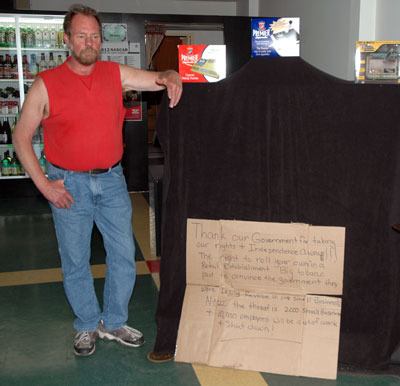ARLINGTON — Dennis Murphy would have celebrated the one-year anniversary of opening Arlington Tobacco Express on the Fourth of July, but the latest legal developments regarding the status of roll-your-own tobacco, both in Washington state and at the federal level, have him facing the possibility that he’ll have to shut his doors for good.
Murphy is still keeping the doors of Arlington Tobacco Express open in the meantime, but he had to shut down his roll-your-own cigarette machine just days after he believed he’d received a reprieve from House Bill 2565, which was passed into law in April by a bipartisan majority of state legislators and requires operators of roll-your-own cigarette stores to collect a tax on the cigarettes that their customers produce with the stories’ roll-your-own cigarette machines.
Franklin County Superior Court Judge Bruce Spanner issued a preliminary injunction on Monday, June 25, preventing the state from collecting the tax on its planned start date of Sunday, July 1, by ruling that Initiative 1053 required state legislators to approve the tax by a two-thirds majority, which they’d failed to obtain. Unfortunately for Murphy and his fellow roll-your-own store operators, the state Attorney General’s office then sought and obtained a stay of Spanner’s injunction from the state Supreme Court within the same week, and a rider has been attached to the federal transportation bill before President Obama, which would revise the IRS tax code to require roll-your-own store operators to obtain manufacturing permits.
“Except they’re not even registering people for that license because they don’t want to get dragged into the courts with other lawsuits against tobacco,” Murphy said. “I’ve kept the building open to tell my customers personally what’s been happening, and because it’s cheaper to just pay the rent than to move everything into storage and then haul it all back out if things turn around.”
Murphy’s wife and daughter both quit their jobs to come work for him, and barely hours before he received word of the stay on Spanner’s injunction, he was seriously considering finally buying a new truck that he’s needed for a while now.
“Usually, if a new business can make it through its first year, it’ll be alright,” Murphy said. “Around the six-month mark, I was wondering whether we’d make it, but just before the House bill came up, I was pretty sure we’d cleared the hump. I’m 54 years old and I’m going to walk out of here owing $30,000 if we close up shop. I didn’t need to be any further in debt.”
Joe Baba, an Everett-based tobacco distributor for the state who owns multiple roll-your-own cigarette stores in the area, echoed Murphy’s accusation that “Big Tobacco” has been funding efforts to undermine the roll-your-own cigarette stores out of fear of competition.
“We’re only allowed to use one brand of tobacco now, which isn’t even available yet,” said Baba, who hopes to continue the fight through the courts. “The government feels like it has the right to take away our customers’ right to choose. Our machines may be silent, but our voices are loud.”







